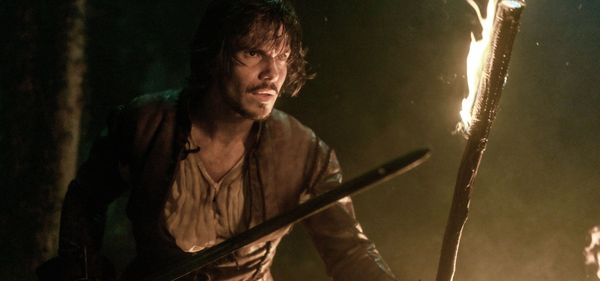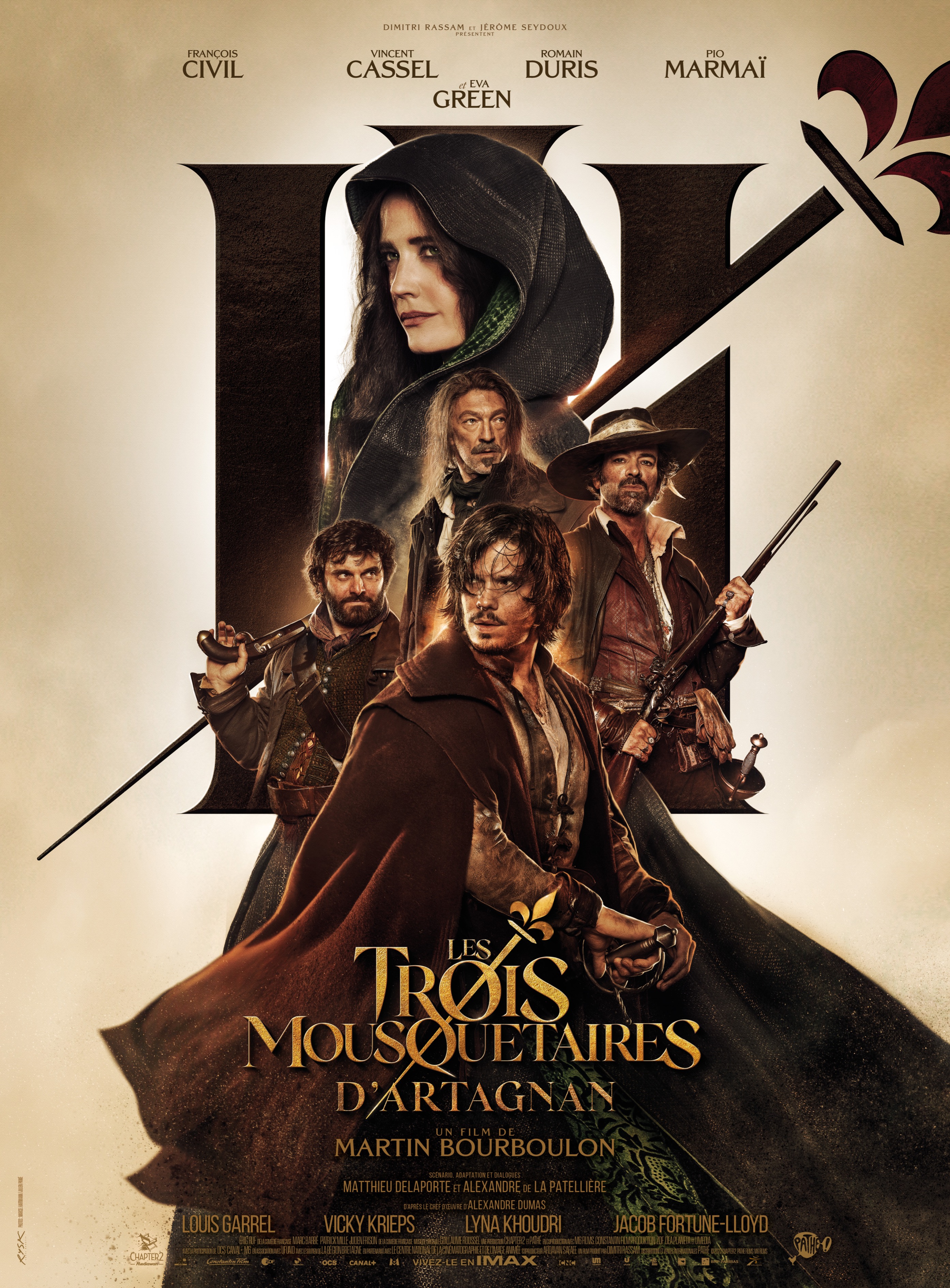Eye For Film >> Movies >> The Three Musketeers: D'Artagnan (2023) Film Review
The Three Musketeers: D'Artagnan
Reviewed by: Andrew Robertson

The first film of The Three Musketeers was some 120 years ago, and while that's now lost there have been dozens of adaptations since. That's not counting the animated versions, the works based on or directly inspired by with some degree of revision, or those that are, like the Spanish-Japanese produced Dogtanian And The Three Muskehounds, both. Though there have been plenty that have gone before this version it does bring a pace and panache to a familiar story. There's something apposite in this being a two part adventure. The original work was serialised over several months and Alexandre Dumas himself would return to the adventures of D'Artagnan and his comrades several times.
"Dumas himself" doing a bit of effort there, as Auguste Maquet felt sufficiently aggrieved that he brought suit for credit as co-author and royalties. He might have done better challenging him to a duel. There's no solid record of Dumas' martial prowess but being the son of "the Horatius Cocles of the Tyrol" reduced to a background figure in Napoleon isn't a guarantee. "Dumas himself" as well because the script by Matthieu Delaporte and Alexandre de La Patellière makes several modifications to the story.

One might call them "liberties" but to be honest there's quite a bit more "egalities" and "fraternities" to it all. There's bisexual representation far more explicit than anything Marvel have even hinted at hinting at. A good chunk of the cast are actors of colour. The pair might be best known for penning animated neo(n)-noir Renaissance but they've action and comedy down pretty well. While the original was serialised and so almost inevitably episodic this part one manages to leap from page-turner to cliff-hanger with some degree of pace.
Opening with quite a bit of text we soon join D'Artagnan as he rides from Gascony for Paris. It won't be uneventful, but it's not so packed with incident that there isn't a question about his age. Francois Civil has charm but he's in his thirties. That does make him considerably younger than the other Musketeers. Vincent Cassel is Athos. He's an actor whose ability to convey anger and regret has been tested before in another two-parter like Mesrine. He's joined by Romain Duris' Aramis, the sophisticate of the group perhaps a little undone by a more than passing resemblance to Jack Sparrow. Jaques Piaf? Rounding them out, Pio Marmaï as Porthos, a man of great strength and greater appetites.
The changes start almost immediately, the fate of a letter, the replacement of a frying pan with a pistol ball, and so on. All serve to get us to the action and in places simplify a quite complex narrative. Less simple is the sheer quantity of effort on display on screen. Though it's only Martin Bourboulon's fourth feature (and part two shot back to back his fifth) it shows quite a bit more verve than a few things I've seen this year from more experienced hands, including Napoleon. Some of that's scale. These are skirmishes often followed by camera movements that might mask the odd cut or otherwise but definitely convey the thrust and parry of conflict. I counted some seven or eight sequences that would qualify as fight scenes, even the odd chase, but some of the other set pieces are even more ostentatious.
There's a costumed ball where D'Artagnan is masked as a hound, or perhaps a fox. There's a wedding whose splendour rivals any coronation. At times I wondered if Nicolas Bolduc had allowed lens flare as a signifier of realness, in the same way videogames make artefacts to obfuscate their artificialities, to suggest they're something more than simulation. At others I just enjoyed that there were actually colours - even when shooting day for night and especially in daylight I could tell reds from blues and more. One moment of state takes great advantage of that in its symbolism and is all the better for it.
It's big, traditional, film-making, anchored in some quality performances. A meeting of the king's council has meaningful glances amongst overlapping conspirators and what the king conveys with a gesture is different to what he reveals with another. There's loads of lovely bits of design, while I suspect they've used every still standing stately home they could get access to they've built, borrowed, or stolen plenty more. The costuming is good. While I might suspect there's more moss on Aramis than any rolling stone it still just about works, and it might be the weakest point. Eva Green as Milady has access to a tremendous wardrobe, including at least one bodice that appears specifically engineered to flatter the wearer and fluster the onlooker. I mean, obviously, but this one is sufficiently fit for purpose that it'd have its own button on an action figure.
In other places action is figured with subtlety. One moment reminded me of The Limey, a scene whose framing is often credited to Steven Soderbergh but I've seen Lem Dobbs say it was in his script and I believe him. There's all sorts of bits I really liked, from a bit of shooting that reminded me of The Favourite though some of that's because of its use of the Wilhelm scream. Elsewhere Guillaume Roussel's score is stirring in all the right places, thematic elements are repeated though perhaps not as often as Dumas made use of time limits for dramatic effect.
That's perhaps the biggest issue with The Three Musketeers: Part One - D'Artagnan, or however one chooses to render its title. With Part Two due in cinemas soon it's difficult to get a hold of this. I tracked it down on DVD because I'd missed it earlier in the year. I'd love to see them as a double bill though I'd want at least a jambon-beurre and a cafe au lait if not steak frites and a big Burgundy between them. It's streaming on some services but "buying" is not buying if rights issues means it can be removed from your account. The DVD isn't anything to write home about, no extras, no additional subtitles, scene selection barely counts as a feature. That's even though one could skip to the finale rather than holding down fast forward. The film is pacy enough that you could probably keep up anyway. It ends on a cliffhanger, naturally, but audiences going into Part Two won't necessarily have the benefit of caring as much as D'Artagnan does.
It'd be easy to say that once both are available in the same place they'll be stronger for it, one for all and all for one and all that. Realities of film-making means there are always going to be compromises, but the film is enjoyable enough that difficulties in getting it watched are a tragedy. While I know that the most important points of this are summarised at the start of Part Two because I've also seen it, I'm saddened by the thought that audiences might not catch both, if not either, parts. There's enough talent on display here that all involved could consider it a feather in their cap. There's a real risk though that between what Bong Joon-Ho called the "one-inch tall barrier of subtitles" and the wider issues with access to media that it's one that'd be left hanging.
Reviewed on: 12 Dec 2023
















